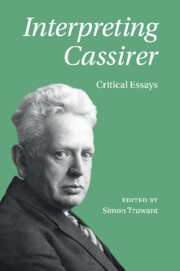Book contents
- Interpreting Cassirer
- Interpreting Cassirer
- Copyright page
- Contents
- Contributors
- Acknowledgments
- Abbreviations
- Introduction
- Part I Cassirer’s Philosophy of Culture
- Part II Cassirer’s Philosophy of Consciousness
- Chapter 8 Rethinking Representation
- Chapter 9 Cassirer’s Philosophy of Mind
- Part III Cassirer’s Philosophical Method
- Bibliography
- Index
Chapter 9 - Cassirer’s Philosophy of Mind
From Consciousness to “Objective Spirit”
from Part II - Cassirer’s Philosophy of Consciousness
Published online by Cambridge University Press: 17 April 2021
- Interpreting Cassirer
- Interpreting Cassirer
- Copyright page
- Contents
- Contributors
- Acknowledgments
- Abbreviations
- Introduction
- Part I Cassirer’s Philosophy of Culture
- Part II Cassirer’s Philosophy of Consciousness
- Chapter 8 Rethinking Representation
- Chapter 9 Cassirer’s Philosophy of Mind
- Part III Cassirer’s Philosophical Method
- Bibliography
- Index
Summary
In this chapter, Guido Kreis discusses the key concepts and arguments of Cassirer’s philosophy of mind. Kreis argues that for Cassirer, the mind is non-atomistic in the sense that mental occurrences are always already “symbolically pregnant” with significance. This leads to a functionalist model of the mind, which understands the mind as neither a physical body nor a metaphysical substance but rather the system of our representational contents. On the one hand, Cassirer criticizes the attempts at a physicalistic naturalization of the mental. Kreis considers this critique in view of the normative dimension of judging and the representational content of recollection and memory (when directed against Bertrand Russell). On the other hand, when rejecting the Cartesian mentalistic framework, Cassirer argues that thoughts are always bound to their expression in language, and as such have a natural place in the social sphere. According to Kreis, this leads to a notion of nature that leaves room for normativity and representational content, or to Cassirer’s understanding of “objective spirit.”
- Type
- Chapter
- Information
- Interpreting CassirerCritical Essays, pp. 170 - 190Publisher: Cambridge University PressPrint publication year: 2021
- 1
- Cited by

